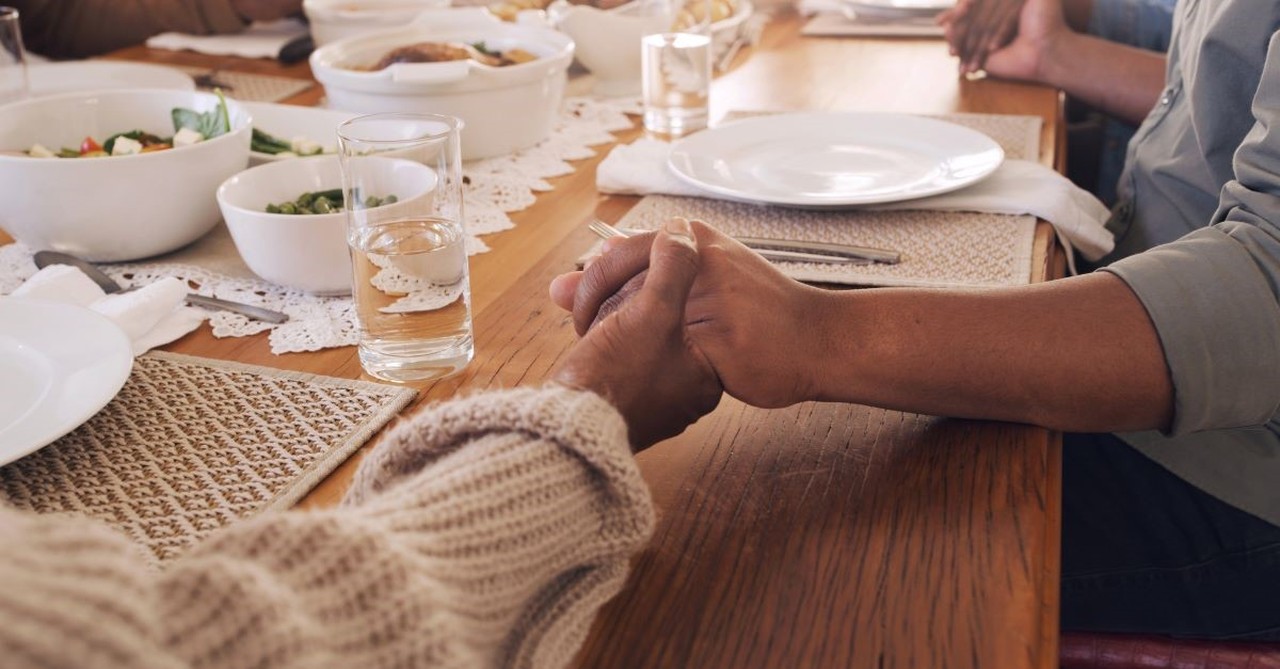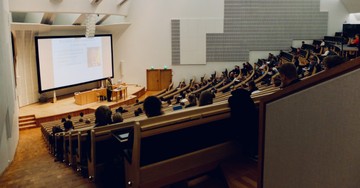
In many homes, praying before meals is a cherished tradition. Saying grace before meals gives us valuable time to pause, reflect, and thank God for providing the food we’re about to eat. But does God require us to pray before meals? Is it a mandate for every believer, or is it a matter of personal conviction? We can learn how God wants us to approach prayer before meals by learning what the Bible reveals about prayer, gratitude, and more.
Here are five biblical principles to consider:
Photo Credit: ©GettyImages/shapecharge
1. Giving thanks for food.

1. Giving thanks for food.
SLIDE 1 OF 5
The Bible provides several examples of individuals giving thanks for food, which suggests a model for us to follow. One notable example is Jesus himself. Before feeding the 5,000, John 6:11 records: “Jesus then took the loaves, gave thanks, and distributed to those who were seated as much as they wanted. He did the same with the fish.” Similarly, Luke 22:19 describes that at the Last Supper, Jesus “… took bread, gave thanks and broke it, and gave it to them, saying, ‘This is my body given for you; do this in remembrance of me.’” By expressing gratitude for God providing food, Jesus serves as a powerful role model for us to follow in our own lives. The Bible shows another example of someone giving thanks for food when the Apostle Paul gives thanks before eating during a storm at sea.
Acts 27:35 records: “… he took some bread and gave thanks to God in front of them all. Then he broke it and began to eat.” This act of giving thanks during a crisis highlights the importance of maintaining an attitude of gratitude in all situations. God encourages to be thankful in every part of our lives – including at our meals – recognizing that: “Every good and perfect gift is from above, coming down from the Father of the heavenly lights, who does not change like shifting shadows” (James 1:17). By following these biblical examples, we show God that we’re relying on him and acknowledging his constant care and provision.
Also, praying before meals can deepen our awareness of God’s presence in our lives. Each meal becomes an opportunity to remember God’s faithfulness and to celebrate God’s blessings. Regular prayer before meals can help us develop a habit of recognizing God’s goodness in both the ordinary and extraordinary moments of our lives. So, it’s a good idea to do so. But that doesn’t make praying before meals a commandment.
Photo Credit: ©GettyImages/Motortion
2. The role of prayer in our lives.

2. The role of prayer in our lives.
SLIDE 2 OF 5
Prayer is a vital aspect of our lives as believers, because it’s our means of communication with God. In Thessalonians 5:17, the Bible exhorts us to “pray continually” while it also encourages us in Philippians 4:6-7 to pray about everything to experience God’s peace: “Do not be anxious about anything, but in every situation, by prayer and petition, with thanksgiving, present your requests to God. And the peace of God, which transcends all understanding, will guard your hearts and your minds in Christ Jesus.”
Prayer should be a regular and integral part of our lives. Praying before meals can be a natural extension of this continuous prayer life. It reminds us to thank God for providing an important basic need – food – before we eat it. Prayer before meals also gives us structured time to pause and recognize God’s goodness, which helps us build strong habits of reflection and gratitude and reflection. Incorporating prayer before meals can also set a positive tone for when we eat our meals. It helps us to be present and to appreciate the food as a gift from God. That can encourage mindful eating, where we savor each bite and recognize the nourishment it gives us. When we pray before meals, we can also witness to others by showing them our faith and reliance on God.
Yet, as valuable as saying grace before meals can be, we need to be careful not to confine prayer to specific times or rituals. We don’t need to wait until we’re ready to eat a meal in order to pray. We can pray anytime, anywhere, and however we like. That’s because God has given us freedom in prayer and wants our prayers to arise naturally from our day-by-day relationships with him. So, we’re free to pray before meals, and we’re also free to eat our meals without having prayed over them. It’s our choice to make with the free will God has given us. What is most important is simply to stay in communication with God regularly.
Photo Credit: ©GettyImages/SARINYAPINNGAM
3. The heart of gratitude.

3. The heart of gratitude.
SLIDE 3 OF 5
Giving thanks is a recurring theme in the Bible. When we thank God for our food, that helps us to recognize and appreciate God’s blessings in every aspect of our lives. It reminds us that we are not self-sufficient but reliant on God’s grace. God wants us to have an attitude of thanksgiving in all situations. In 1 Thessalonians 5:18, the Bible instructs us to: “give thanks in all circumstances; for this is God’s will for you in Christ Jesus.”
Thanksgiving is not limited to specific times or conditions, such as praying before meals. Since the heart of gratitude is to have a constant attitude of thanksgiving, we should develop habits of thanking God in all areas of our lives. Doing so will strengthen our well-being and help us grow closer to God – the source of all love – because expressing gratitude is a way of expressing love. Gratitude also shifts our focus from what we lack to what we have, leading us to experience contentment and joy in any circumstances. This perspective helps us learn that we can always count on God to be there for us. Since we can always rely on God, we can always find something to be grateful for. We simply have to focus on our generous God.
So, when we have grateful hearts, we can pray with true thanksgiving before any kind of meal – from a lavish feast to a simple snack. Being truly grateful helps us notice and appreciate the wonder of God’s work in every part of our lives, helping us feel awe for God and turning any activity into an expression of worship. Whether or not we pray before our meals, God wants us to live each day with gratitude.
Photo Credit: Wavebreakmedia
4. Grace over legalism.

4. Grace over legalism.
SLIDE 4 OF 5
If we do pray before meals, we should be motivated by grace rather than legalism. A legalistic approach focuses on strictly following rules and rituals, which makes us feel a sense of obligation to pray over every single meal and a sense of guilt whenever we skip praying before any meal – even when we may be dealing with a situation like being rushed or ill. Legalism also makes prayer just something to check off of our to-do lists rather than authentic communication with God from our hearts. Jesus warns us against legalism, saying in Matthew 6:7: “And when you pray, do not keep on babbling like pagans, for they think they will be heard because of their many words.” Here, Jesus emphasizes the importance of sincerity and heartfelt prayer over rote repetition.
Legalism can lead to a mechanical approach to faith, where the focus shifts from a relationship with God to just checking off religious duties. This is contrary to the spirit of grace that Ephesians 2:8-9 describes: “For it is by grace you have been saved, through faith – and this is not from yourselves, it is the gift of God – not by works, so that no one can boast.” Our salvation and our relationship with God are based on his grace, not our ability to follow religious rituals perfectly. When we pray before meals, it should come from a place of genuine gratitude and recognition of God’s grace in our lives, not from a sense of obligation. God’s grace covers us even when we fail to adhere to certain practices. Our relationship with God is not contingent on our actions but on his unconditional love for us. We can celebrate that God has given us grace about whether or not to say grace before our meals.
Photo Credit: ©GettyImages/FreshSplash
5. Freedom in Christ.

5. Freedom in Christ.
SLIDE 5 OF 5
We are free either to pray before meals, or to not pray before meals, because God has given us freedom in Christ. Galatians 5:1 reveals: “It is for freedom that Christ has set us free. Stand firm, then, and do not let yourselves be burdened again by a yoke of slavery.” This freedom includes our spiritual practices, including whether or not we pray before meals. While praying before meals is a beneficial practice, it is not a legalistic requirement. We are free to decide how and when we express our gratitude to God. This freedom allows for flexibility and personal conviction, freeing us to focus on the essence of our faith rather than rigid adherence to rituals.
Romans 14:5-6 speaks about this freedom: “One person considers one day more sacred than another; another considers every day alike. Each of them should be fully convinced in their own mind. Whoever regards one day as special does so to the Lord. Whoever eats meat does so to the Lord, for they give thanks to God; and whoever abstains does so to the Lord and gives thanks to God.” This passage highlights the principle that we should respect individual convictions and practices, as long as they are done with a heart of thankfulness to God. The focus is on the motivation behind the practice rather than the practice itself. Our freedom in Christ allows us to develop personal traditions and habits that help us grow in our relationship with God.
Also, this freedom in Christ encourages us to approach our faith with a spirit of joy and spontaneity. We can find creative ways to express our gratitude and to incorporate prayer into our daily routines. Whether we choose to pray before every meal, during certain meals, or in other ways, the key is to maintain a heart of thanksgiving and reliance on God. Praying before meals – when we choose to do so – can remind us of God’s generosity in giving us food, freedom, and many more blessings.
In conclusion, praying before meals is a valuable practice that relates to important biblical principles like prayer and gratitude. It’s a wonderful way to celebrate God’s goodness. But it’s not a requirement. God gives us freedom and grace for everything in our lives – including whether or not we pray before meals. Whether we choose to pray before every meal or not, what matters most is our heartfelt thankfulness for God and the blessings God gives us. So, let’s be motivated by graceful gratitude rather than legalism, embracing the freedom we have in Christ to express our faith in meaningful and sincere ways.
Photo Credit: ©iStock/Getty Images Plus/monkeybusinessimages

Originally published August 05, 2024.







